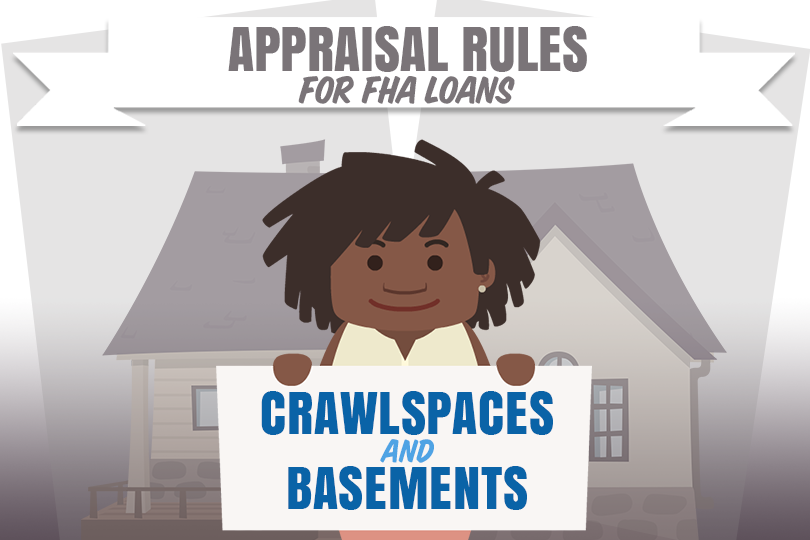FHA Appraisal Rules for Basements
May 7, 2022
You may not be on the hook for those corrections, but if you are trying to negotiate with a seller in a competitive market and you really want that house, negotiating who pays for the appraisal correction might be something to consider.
With that in mind, what are the FHA appraisal rules for a home that comes with a basement or crawlspace? The FHA appraisal process includes specific standards in this area which must be met. In cases where there are corrections required as a condition of loan approval, those corrections must be made and inspected--it’s not done on an honor system.
The basic rules in this area begin with the general condition of the foundation--it must be adequate to properly support the home.
HUD 4000.1 contains rules for the lender and appraiser. It states, “The Mortgagee must confirm that all foundations will be serviceable for the life of the Mortgage and adequate to withstand all normal loads imposed.” And what happens if this is not true?
The FHA list of “defective conditions” for basements, crawlspaces, and the foundation includes:
“…evidence of possible structural failure (e.g., settlement or bulging foundation wall, unsupported floor joists, cracked masonry walls or foundation)”
Such conditions would be noted by the appraiser--corrections are recommended where feasible but such corrections are not always possible. If the problems cannot be corrected, the home cannot qualify for an FHA mortgage.
The foundation and the basement should be “serviceable” over the entire duration of the loan term or must be repaired or modified to make that possible.
According to HUD 4000.1, “The Appraiser must perform a visual observation of the foundation and Structure of the improvements and report those results.” In cases where the FHA appraiser detects a structural issue, HUD 4000.1 says the Appraiser must “address the nature of the deficiency in the appraisal where physical deficiencies or adverse conditions” are reported and which may demand an inspection.
Basement issues may include things not directly related to the structural soundness of the foundation. For example, sump pump systems must be suitable to properly service the home and must be in good repair. If the appraiser notes the sump pump system does not meet these basic requirements, corrections are likely to be required in the appraisal report.
Any evidence of excessive moisture in a basement or crawlspace is an area of concern for the appraisal. If you note standing water, trickling water, or very damp basement walls when you do your initial walkthrough of any property, you can expect the appraiser to note the same problems.
------------------------------
RELATED VIDEOS:
Here's the Scoop on Conventional Loans
When Do You Need a Cosigner?
Analyzing Your Debt Ratio

FHA Loan Articles
October 30, 2021The FHA Rehabilitation Loan program allows lenders to cover the purchase or refinance, as well as the rehabilitation of the home, as part of a single mortgage. This loan can be used to finance a property that is at least one year old with a total cost of repairs amounting to at least $5,000
October 16, 2021The FHA’s aim is to make homeownership more affordable and accessible for Americans, and it has been doing so for decades. It insures home loans made by FHA-approved lenders so borrowers can purchase single-family and multi-family homes in the US and its territories.
September 20, 2021A down payment is an upfront installment or part of a larger amount paid on a purchase. The remainder is paid off in separate installments, usually with interest, as part of a loan. The down payment represents your initial ownership stake in the home you continue to make payments on.
September 2, 2021For many first-time home buyers, the FHA loan is a popular option. With its lenient credit and income requirements, it appeals to young borrowers who don’t have an extensive credit history, or enough money saved up for a down payment.
August 9, 2021Many first-time homebuyers need some help understanding and navigating the ins and outs of the mortgage process, and down payments are an essential part of that. A down payment is an upfront installment made on a large purchase while the remainder is paid off with a loan.







